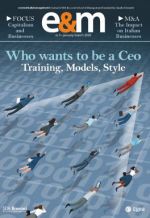Companies, Entrepreneurs, and Growth: Guido’s Open Challenges
Guido Corbetta never failed to make an impression on people. Indeed, he left a deep, indelible mark, a legacy of ideas and challenges that are now ours to nurture and grow. Guido not only ran our Economia & Management magazine, he also held many roles at SDA and the University. But more than all this, he paved new paths, with his signature style that always characterized everything he did. And thinking of these new paths, family businesses are what immediately come to mind, the common theme in all his studies and all his work. This was his biggest passion, what drove him to tackle issues like governance, and to explore the relationship between family wealth and family, analyzing the phenomenon of family offices in previous generations, which would lead to the relationship between the financial system and investors.
Today these topics seem like nothing out of the ordinary, but that certainly wasn’t always the case. They’ve helped us recognize the importance of family businesses in the economic development of our country. On this score, Guido was always ahead of the times, with clear-eyed intuitions that would eventually become mainstream. For instance, in 2005, Guido opened the first AIDAF conference (the Italian Association of Family Businesses), by referring the family businesses as a patrimony that served the good of the country. This is true under certain conditions, of course, because nothing can be taken for granted, as he said in his 2004 book, “Capaci di crescere” (Egea), where he explores the deep-seated reasons why some businesses are “capable of growth” (as per the title) and others are not. It’s a critical question, today more than ever before, as is the matter of company size. Without growth, it’s hard to imagine a world with the same level of wellbeing as the one we’ve been living in till now. And it would be hard too without the central role of entrepreneurs, the people Guido always tried to listen to and understand, deeply. From here it was only natural to go from research to teaching to consulting, continually linking all these activities together with an open spirit, instilling everything he did with energy and enthusiasm.
Forging new paths means imagining things differently. This is what happened when a university chair was created at Bocconi that was dedicated to family businesses, at a time when the concept of an “endowed chair” was unheard of, far removed from Italian culture. Yet this chair helped shine a light on these issues, creating closer connections with the stakeholder system and the research sphere. This is also what happened when a training program was designed especially for businesspeople who wanted to go public with their companies, which in turn was the inspiration for Bocconi’s ENTER Research Center, dedicated to entrepreneurs. And this was followed by the Elite Project, in collaboration with the Borsa Italiana, with our university serving as the driving force. It’s incredible to think that as of today, more than 1,000 companies have participated in these programs. And then there’s the MP3 Project, which ran from 2012 to 2015, dedicated to the study of PPPs (Public-Private Partnerships) at a time when the public and private spheres were worlds away. This ability to look toward the future, without being afraid to innovate, connecting academia with the industrial system: this was Guido’s distinctive approach, infused with deep thought and persistent action, which would leave no one unmoved, because his passion was palpable.
As a School of Management, we need to forge more paths, and today more than ever before. Always future forward, asking ourselves if maintaining the status quo is the right thing to do, or if we’re simply afraid, or we just want to rest on our laurels. We also need solidity and consistency, grounded in common themes that are both sophisticated and robust, enabling us to delve into key issues with enthusiasm and diligence, beyond ephemeral passion, the flash in the pan kind that follows fads and comes and goes go easily.
Today, with Guido, there would be so much more to say, and to say again. How do we reconcile the paradigm of family businesses with a world of corporate giants and companies that compete by leveraging size? What can – and should – we as a School of Management do to empower companies to grow? What conditions and what training courses do we need to put in place to bring up new generations of entrepreneurs? What does it mean to hand down wealth and the repository of relationships to future generations? The list would probably be even longer if Guido were here – he would find a path that we can’t see.
The beauty of a challenge is having an open ending, and always leaving it that way, without imagining what the finale will be, forever being surprised by the result (which sometimes is more than we hoped for).
Dear Guido, at our School of Management, this is the path we’ll continue to follow.
Stefano Caselli is Dean of the SDA Bocconi School of Management (since November 2022), Full Professor in Investment Banking (since 2007) and Algebris Cahin in Long-Term Investment and Absolute Return (since 2019) at Bocconi University. He also sits on the board of the SDA School of Management (since 2006).
Photo iStock / Nadya So



